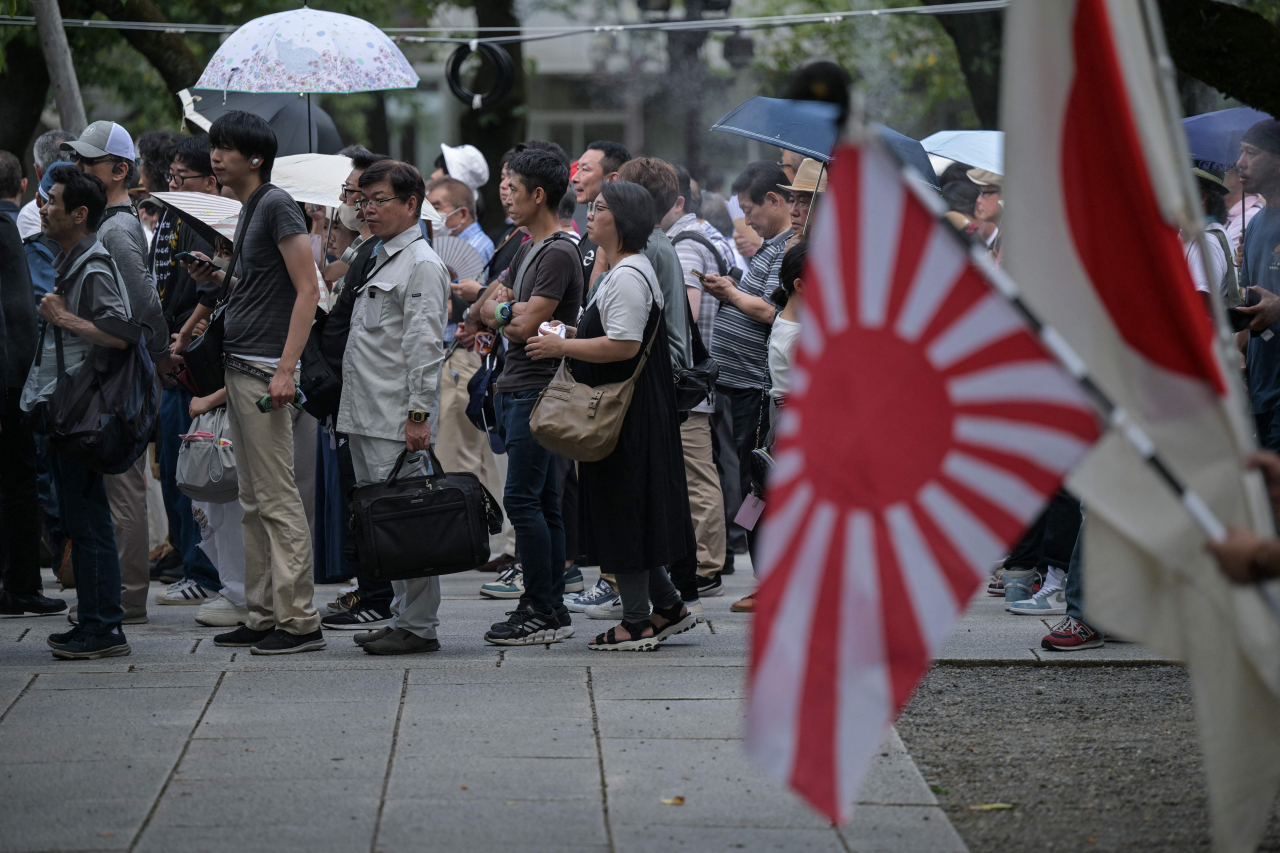 |
People queue up to pay their respect and say prayers during a visit to the Yasukuni Shrine in Tokyo on Thursday, on the 79th anniversary of Japan's surrender in World War II. (AFP-Yonhap) |
Seoul's presidential office is facing mounting pressure as controversial remarks regarding Japan by President Yoon Suk Yeol's foreign policy aide have prompted criticism from the opposition for bringing humiliation to South Korea.
Labeling the aide's remarks as carrying the intention of a "pro-Japanese traitor" -- or "chinil" in Korean, describing those overly favorable to Japan to the extent of betraying national interests -- the liberal main opposition Democratic Party of Korea pledged Tuesday to propose a bill to prohibit people who had previously praised or justified Japan's 1910-45 colonial rule of the Korean Peninsula from becoming public officials. The main opposition party also pledged to introduce the bill as closely aligned with its core party policy, meaning that party members would all vote for it to counter Yoon's conciliatory approach to Japan.
The latest controversy hails from a media interview with Kim Tae-hyo, the first deputy director of the presidential National Security Office. Kim said in an interview with public broadcaster KBS on Friday evening that Yoon's omission of Japan's wartime wrongdoing from his Liberation Day speech comes from Seoul's forward-looking approach to its bilateral ties with Tokyo.
"If Japan turns a blind eye to its history and fails to say what it should say, we should harshly complain about it and try to change that," Kim said.
"But what matters is Japan's feelings (about apologizing)," Kim added. "When we pressure someone who does not feel inclined to do so to apologize, does that truly help Korea-Japan relations and cooperation? The level of trust between Kishida and Yoon seems very high."
This answer was in response to the interviewer's question about criticism over Seoul's failure to speak up boldly about bilateral issues with Tokyo.
The main opposition, which holds a solid majority of seats at the National Assembly, said in a statement Saturday that Kim's argument about Japan's apology being worthless as long as it does not feel inclined to do so is "appalling," adding this is one example indicating that the presidential office's political philosophy is similar to that of Korean collaborators of Imperial Japan who betrayed their country during Japanese occupation.
Later, a separate comment by a senior official of the presidential office on Sunday added fuel to the controversy, saying Japan's series of apologies "more than a dozen times" since the Korea-Japan normalization treaty in 1965 "left Japan fatigued."
Rep. Lee Jae-myung, the recently reelected chair of the main opposition Democratic Party of Korea, said Monday that the presidential office should "take stern actions" against Kim over his remarks.
Kim added that any public official in the presidential office "must consider the feelings of the South Korean people, not the feelings of the Japanese people," adding Seoul "should not take the feelings of the emperor of the Japanese Empire into account."
It was the first party meeting Lee convened following his resounding election victory at the Democratic Party convention Sunday, through which Lee was able to extend his leadership in South Korea's largest liberal party.
Newly elected Democratic Party Supreme Council member Rep. Kim Byung-joo upped the ante Monday, describing the Yoon administration as "worshippers of Japan."
Kim's remarks have also triggered critique from within the conservative ruling bloc.
Rep. Shin Dong-wook of the ruling People Power Party said in a radio interview Monday that Kim should have avoided using such an expression given the sensitivity of the matter to the South Korean people.
When asked what actions would be taken against Kim, an official of the presidential office on Monday said on condition of anonymity that the liberal parties are taking advantage of the "pro-Japanese traitor" framing for political attacks that "invoke social division."
Criticism of Yoon over his radically amicable approach to Japan has been nothing new, although Washington has often lauded Seoul-Tokyo rapprochement as a cornerstone for trilateral ties between Korea, Japan and the United States.
Throughout Yoon's term, which started in May 2022, his effort to restore Seoul's ties with Tokyo have faced domestic backlash in that it has come without Japan "properly" acknowledging and apologizing for its wrongdoing during the decades of colonial rule of the Korean Peninsula.
Especially in the past month, the Yoon administration has supported the listing of the Sado mines in Japan as a UNESCO World Heritage site in a surprise turnaround despite a historical dispute over Korean forced labor there that critics here argue has not been fully resolved.
Yoon's nomination of controversial figure Kim Hyoung-suk as the new chief of the Independence Hall of Korea also led to a boycott by liberal opposition parties and a civic group of independence activists' bereaved families of Seoul's planned Liberation Day celebration on Thursday. Kim was accused of being a proponent of the New Right political movement known for justifying Imperial Japan's colonial occupation of Korea as the source of its modernization.
Furthermore, Yoon in his Liberation Day speech last week omitted any call for an apology from Japan over its wartime atrocities -- from the euphemistically labeled "comfort women" to forced labor -- or its territorial claims to the Dokdo islets about 217 kilometers off the east coast of the Korean Peninsula, unlike his predecessors including former President Moon Jae-in.







![[Today’s K-pop] Blackpink’s Jennie, Lisa invited to Coachella as solo acts](http://res.heraldm.com/phpwas/restmb_idxmake.php?idx=644&simg=/content/image/2024/11/21/20241121050099_0.jpg)